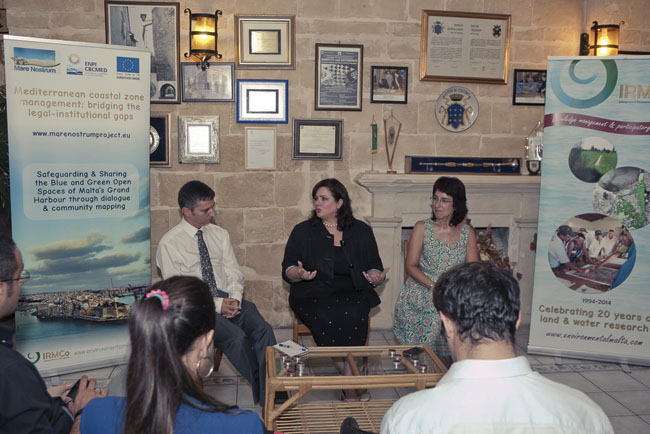This week, representatives from local communities in the Grand Harbour area launched a joint charter – a first for Malta and the result of several months of intensive dialogue – on safeguarding and sharing the green and blue open spaces, and making the Grand Harbour region “a place for our children”.

The Local Communities’ Charter for liveable cultural landscapes in our Grand Harbour: A Place for Our Children marks a significant milestone in the European Neighbourhood and Partnership (ENPI)-funded Mare Nostrum project, which focuses on integrated coastal zone management (ICZM) in the Mediterranean.
Integrated Resources Management (IRMCo) Director Anna Spiteri, the Maltese partner in Mare Nostrum, has been leading the research locally with her enthusiastic team. Following an initial review of the coastal planning laws, various stakeholders were interviewed.
The lack of integrated planning, leading to overdevelopment and conflicting uses of the front (blue) and back (green) of Grand Harbour, emerged as one of the main concerns. Residents specifically fear losing more open spaces and cited the lack of empowerment and enforcement as their biggest frustration.

A series of interactive seminars have been held to address these concerns, bringing together the grassroots of the local communities including local councils, heritage and environmental NGOs, university lecturers and artists, as well as local and foreign residents.
The charter grew from intensive brainstorming and creative social dialogue and reflects the aspirations, visions and recommendations of the local communities of the inner harbour region. It aims to empower the citizen by describing principles of best practice on safeguarding and sharing the green and blue open spaces, coastal areas, trees, soil, agricultural land and valleys and built heritage, finishing on a strong note on the need for genuine public participation.
All authorities, planners, stakeholders, decision-makers, and NGOs concerned with present and future development plans for Grand Harbour are invited to endorse the Charter.
Speaking during its launch at Senglea Local Council’s offices, Social Dialogue, Consumer Affairs and Civil Liberties Minister Helena Dalli stressed the importance of social dialogue amongst stakeholders, not least on issues that concern our environment. “This charter is the result of ongoing discussions and feedback raised by citizens who have our environment at heart, with particular focus on the inner harbour region,” she said.
Dr Dalli explained how such initiatives can contribute to the enhancement of good governance at all levels of government. The Charter was endorsed by six local councils in the Grand Harbour area, as well as environmental NGOs, other civil societies and residents.
Looking ahead, the Charter also provides the stepping stone for the next phase in the project, which will focus on more sustainable management of the coastal area.
IRMCo is also organising a community mapping workshop (Public Participatory Geographic Information Systems) as an empowerment tool to implement the best practices outlined in the charter. PPGIS combines social dialogue with hands-on mapping technology and contributes to a real time visual planning process.
The Mare Nostrum consortium, consisting of 10 partners from Israel, Greece, Spain, Jordan and Malta, receives €3.88 million in funding from the EU through the ENPI instrument.